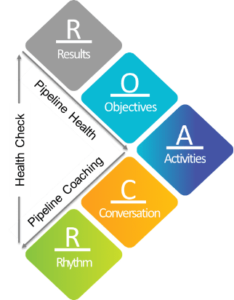What is Pipeline Coaching and Why Is It Important?

Effective discussions and coaching around sales pipelines can lead to 15% more relative revenue growth.
By Michelle Vazzana
Sales Pipelines are a big deal. We conducted research with the Sales Management Association (SMA) and when surveyed about how frequently sales teams expected to meet to discuss their pipelines, over 50% of sales managers answered at least every week, and another 16% said several times a month. In that same survey, we found that these meetings last 53 minutes on average.
Obviously, if companies value this time so much, they must be using it effectively, right? Unfortunately, they’re not. Only 44% of sales managers and executives surveyed deemed those meetings to be effective.
So why aren’t these meetings and pipeline discussions as effective as sales leaders want them to be?
Pipeline Forecasting vs. Pipeline Management
Well, it has to do with the confusion about using pipelines to forecast sales, instead of using them as tools with which to coach. In other words, companies conflate forecasting with pipeline management, rather than separating them into the distinct processes they should be.
Forecasting can be a valuable way to assess outcomes, but unless salespeople are actively coached to achieve these outcomes, the forecasting alone will not help increase win rates. Rather it will be disconnected from the actual things that are driving these win rates, the coaching that the sales team is receiving around their pipelines. So why then do managers and executives continue to focus so heavily on pipeline forecasting?
It’s probably because they’re viewing a pipeline too holistically, rather than breaking it down into its more important constituent parts. A pipeline is really a view of multiple sales opportunities at any given moment in time, not a single entity.
So, managing the sales pipeline is really a multifaceted process that gets oversimplified. A pipeline can’t be managed so much as the individual sales opportunities within can be coached to and monitored.
So that begs the question of how exactly do you coach salespeople on the activities that matter most to closing the opportunities within their pipelines?
The Real Definition of Pipeline Coaching
Pipeline Coaching conversations should be about examining the health of a pipeline and discussing how to improve the chances of winning deals based on the particular scenario presented and the stage the buyer is in within the buyer’s journey.
Another way to think about pipeline coaching, to break it down in terms we’ve used before, is coaching to the opportunities presented within the pipeline. Since pipelines are just a series of opportunities, this involves digging into specific, live opportunities to increase a seller’s likelihood of winning desirable deals.
So, what kinds of specific things should these coaching conversations be comprised of? They can include assessing rep performance, reviewing rep activities, helping properly qualify deals, helping to close deals, identifying process bottlenecks, or identifying skill deficits.
Also, as we discussed in our article on Organizational Agility, this coaching should be directly aligned to organizational KPIs. In the graphic below you can see that based on the results and objectives you expect to achieve, the activities a manager coaches should tie directly to desired organizational outcomes. The opportunities a manager chooses to coach should reflect the KPIs or sales objectives that are relevant to desired results. For example, if expansion of share of wallet within existing customers is an important KPI, the pipeline should reflect additional deals within existing customers that represent the products you want salespeople selling.
Then you need to think about how best to structure coaching conversations around those activities and the rhythm or frequency of these conversations that is most efficient.
As we said earlier, the pipeline is a snapshot of a moment in time, so this is a process that needs to be continually measured and refined as you assess what’s working and what needs to be altered.
Keep coaching aligned to the results and objectives that are important to your organization.
How Beneficial is Effective Pipeline Coaching?
Pipeline coaching can make or break your sales team’s ability to effectively reach their goals so it’s vitally important to get it right.
One Fortune 500 company we worked with was struggling mightily with effectively managing their pipelines, and because of this, their win rates were at an all-time low.
To fix this, VantagePoint helped them do the following:
• Focus management activity toward hands-on coaching
• Establish a formal management rhythm to increase the volume of coaching
• Add definition to recurring sales pipeline conversations
• Emphasize pipeline health – qualifying and disqualifying opportunities early in the sales process
• Improved coaching skills to improve the quality of sales calls and advance winnable deals
This emphasis on pipeline coaching helped get them back on track. Win rates grew from 37% to 71%, forecasted revenue realization improved from 25% to 54%, and despite a more stringent focus on qualification, average pipeline size increased.
Looking Ahead
We hope this brief overview of pipeline coaching was a helpful introduction to this very important topic. In the next few blogs, we will take an in depth look at multiple ways sales pipelines can be used. We’ll start with using pipelines to forecast sales.
As we said earlier, sales forecasting with pipelines is important, but we need to define it so we don’t conflate it with coaching and miss out on the even bigger value pipeline coaching can bring to your business.
Our Offerings
The Sales Management Code™ equips sales managers with a simple, yet powerful framework for aligning seller and manager efforts to desired business results, coaching in ways that drive maximum impact, and assessing leading indicators of progress to determine if sellers are on the right path to quota.
The Pipeline Coaching Code™ equips sales managers and leaders with a powerful framework for assessing the health of the pipeline, considering size, contents, and progress. It then equips managers to make deliberate decisions about how to ensure the health of the pipeline and the viability of deals within the pipeline. Managers will reorient effort toward the early stages of deals to improve deal viability and velocity.
VantagePoint Performance is now part of Imparta, a global leader in performance improvement for customer-facing teams.
